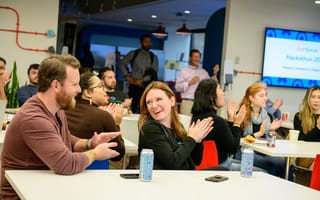In the height of the pandemic, leadership at Boston-based online platform CarGurus introduced a number of strategies for sustaining their innovation and collaborative culture. One solution? A two-day hackathon that now serves as a prime example of the business’ longtime value proposition: to foster unconstrained creativity and cross-functional teamwork.
Product Manager Gardner Nash distinctly remembers a fully-remote trial run that gave way to the hackathon’s current hybrid iteration launched last year.
Car what?
The days of the crowded ping-pong table and wearing multiple hats eventually gave way to an IPO, new markets and scaling teams. But CarGurus always retained its collaborative spirit and ambitious plans for growth.
“It was an environment where it seemed like everyone could do something incredible,” Nash recalled. “We had a vision of disrupting the listings market and fighting established players while being a company whose name people were still learning how to pronounce. We’ve come a long way since then but in many ways hold the same values and goals.”
“As I was walking around the day of the event, I’d see people engaging with other team members across domains and even offices, including San Francisco, Dublin, and here in Cambridge,” Nash said.
To make it a company-wide event, CarGurus’ hackathon embraced a hybrid model. To accommodate everyone, organizers carved out dedicated coworking rooms for teams to meet, as well as shared spaces for individuals working on their own projects. Photos reveal a highly collaborative process – and T-shirts printed just for the occasion to bring people together.
The company, which guides consumers and dealers through all steps of the automotive journey from selling to financing to car delivery, also ensured proper online infrastructure allowed remote members to join in without friction. This included staff at its west coast subsidiary Autolist, led by Pamela Lu, director of engineering and one of this year’s hackathon judges.
As someone with experience with internal hackathons, Lu found the timing impeccable; her team had been asking about setting up a similar event. “Some folks who had just joined Autolist that week didn’t know a lot of people,” she explained. “So it was a great moment for them to dive in.”
“It was an energy that I saw before the pandemic, people innovating right there in the moment.”
Winning the hackathon and translating the team’s idea into a real-life product is enticing. But the camaraderie played a big role too, according to Payal Dodeja, a software development engineer at CarGurus and winner of this year’s Most Innovative award.
“During that time, I met two team members who went to the same university as me,” she said. “And here we are, creating something, making the most out of the company along with all the fun that came with it.”
A Heartwarming Display of Camaraderie
Among the goals of CarGurus’s hackathon is featuring cross-functional inclusivity. No matter the location, department or role, diverse teams drive results.
A Place for Every Employee
With nearly 150 participants across five offices and two dozen teams, CarGurus made sure non-technical employees were not left behind: interns collaborated with VPs; sales and HR were embedded among product members; and a “Hackathon Survival Guide” helped first-timers contribute with confidence.
Validating this mission was Dodeja’s team. Her team won this year’s innovative award, but it couldn’t have been done without product manager Tori Swartz, its one non-technical member.
“We can put in the tech we are using,” Dodeja said. “But we are not great at articulating it. Tori helped us put the whole idea in a presentation and deliver it to the judges.”
An inclusive environment, however, extends beyond roles. With work-life balance a high priority at CarGurus, employees could work how they wanted on their hackathon project, tailored to their personal circumstances.
One of Dodeja’s team members, Misha Shelemetyev, who had the idea behind their project, could not come in because he had to take care of his daughter. “We ended up having the youngest engineer, at six months old, working on his lap and creating a mobile application,” she said with a smile.

The Hackathon’s Origin Story
The unity brought about by the event was a culmination of its intended purpose. “People — with various backgrounds and range of experiences — bring different perspectives,” Lusaid. “So our projects focused as much on how to share their stories as they did solving problems.”
As a judge, this vision was especially clear to her. Even though she didn’t directly participate in creating these projects, they offered a closer look at how her colleagues functioned as integrated teams.
“The hackathon gave me a window into problems people face day-to-day,” Lu explained. “The more we do these types of events, the more these issues surface for better knowledge sharing, product innovation and technological exploration.”
“The hackathon gave me a window into problems people face day-to-day.”
The origins of CarGurus’ hackathon stemmed from a plucky attitude toward innovation.
“CarGurus’ mission is to give people the power to reach their destination,” said Lu. “For everyone participating, the company provides the space and support to explore those ideas through to fruition.”
From Ideation to the Project Pipeline
From the start, employees who participated in the hackathon had full leadership support. Product mentors coached teams on ways to refine and pitch their projects to the judging panel as viable business ideas. It also implemented a system awarding extra points to ideas that supported Diversity, Equity, Inclusion and Belonging (DEIB) initiatives or environmental sustainability. In the past, ideas that went on to become full-fledged features included CarGurus’internal “EZ Deploy” tool and a concept to make the consumer-to-dealer sales engine more transparent, flexible and sustainable.
At the Hackathon, It Smells Like Team Spirit
To get the whole company into the spirit, Nash and the rest of the organizers placed red and blue balloons wherever there was a hackathon team working in the office. The event wasn’t mandatory, but non-participating employees could still enjoy the festive atmosphere and cheer on their colleagues this way.
“Everyone had their way of engaging with the experience,” Nash said. “It all culminated in an award ceremony, a celebration where everyone was together showing their top pitches.”
With the view of CarGurus’ future office across the Charles River during the award ceremony, the event was a reminder of the company’s disruptive roots — ideas that gave birth to core features, products that helped expand markets. “We’re exploring technologies that have not yet reached our day-to-day work yet,” Nash said.
True to those words, the winning hackathon project from Dodeja’s team — a mobile application powered by emerging tech — was a product she wished she had in real life.
“It’s an incredible thing to see teams leave the hackathon having points of contact at other parts of the company,” he continued. “No matter the challenge or ideas we come across, whatever the role, we now have more people across the board to help out and move us forward.









